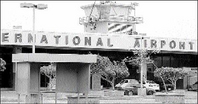We are doing our part - MBJ
Published: Sunday | September 20, 2009

A section of the Sangster International Airport in Montego Bay which was closed hours before the arrival of Hurricane Dean in 2007. - file
The following is a response from MBJ Airports Limited to the lead story carried in last Sunday's Gleaner on security breaches at the Sangster International Airport in Montego Bay.
MBJ Airports Limited is a concessionaire vested with the responsibility of operating, managing and developing Sangster International Airport.
The regulatory authority remains with the Airports Authority of Jamaica (AAJ) and the Jamaica Civil Aviation Authority (JCAA).
MBJ engaged in the process of establishing and implementing a written airport security programme which is appropriate in meeting the requirements of the National Civil Aviation Security Programme.
purpose of security
The purpose of the airport security programme is to outline procedures implemented by MBJ through the authorisation of the JCAA Civil Aviation Regulations (2004) as amended to comply with the requirements of ICAO's Annex 17 standards and recommended practices (seventh edition) as well as the JCAA National Civil Aviation Security Programme (NCASP).
The programme is designed to safeguard civil aviation against acts of unlawful interference. The NCASP does not regulate illegal substances and as a consequence, the airport operator has no authority to police the trafficking of illegal substances; that is the domain of the country's security forces.
Though the State conducts periodic security audits, MBJ as operators shall conduct internal self- audit and leaves to the State, with its suitable organisational framework, the business of compliance and enforcement.
smuggling of narcotics
The survey to which the article refers was conducted to check and review aviation security, as well as identify and reduce areas for potential narcotics transfer. The responsibility for addressing narcotics issues resides with the Government, specifically through the Jamaica Constabulary Force (JCF), which MBJ recognises has been working diligently to mitigate incidents involving narcotics transfer.
Though not tasked with the primary responsibility for such, MBJ Airports Limited works in collaboration with all relevant government entities, as a cohesive unit, to provide and implement solutions for this on-going problem. The smuggling of narcotics is an age-old issue, and attempts to do so via airports will continue, as airports provide the fastest transport mode for any tangible item.
The issue of contraband movement through airports has been continuously monitored and managed by the police.
baggage and cargo control
Responsibility to control baggage, cargo and any other kind of items to be transported in the hold of aircraft as well as passengers and their luggage, is that of the airlines. However, airlines usually leave this task to their respective ground-handling agents.
Prior to December 2008, screening for all passenger-checked baggage was conducted by security contracted by individual airlines or their respective ground handlers. As a regulatory requirement, a new baggage-screening system was gradually implemen-ted July-December 2008. As required by regulation, this system provided for the detection of weapons and explosive but not narcotics.
Following the results of the survey, in a plan proposed by MBJ, the implementation of a programme was undertaken to search for narcotics, at a non-recoverable cost of approximately J$25 million annually.
MBJ has contracted public and private security firms to provide access control at non-public areas of the facility. Security screening for checked baggage, passengers, and their carry-on is provided by Port Security Corps, an entity under the Ministry of Transport and Works. A programme for rehabilitation of the airport perimeter fencing is well under way and close to completion. In support of these security measures, MBJ also provides approximately 200 closed-circuit television (CCT) cameras throughout the airport.
Based on previous incidents, it has been determined that narcotics breaches at the airport are not through perimeter fencing. It is apparent that the problem lies not with passenger and carry-on baggage, but rather with cargo and luggage transfer to the aircraft. It has also been noted that there have been no identified breaches via the baggage-screening system. It has been indicated by the authorities that transfer of narcotics is being facilitated through collusion and networking of personnel from these entities with access to cargo and hold-baggage facilities, and ultimately, to the aircraft.
security breach
All merchandise, including duty-free items, are subject to the same level of screening at access-control points, which is required throughout the entire airport. Should the JCF advise MBJ, by letter of information, of a security breach, committed by any of its concessionaire/tenants, MBJ reserves and will exercise the right to cancel the said contract with such entity.
MBJ shall remain compliant with all security regulations and is fully supportive of the Jamaica Constabulary Force and the Government in seeking and implementing solutions to address the problem of narcotics transfer.










